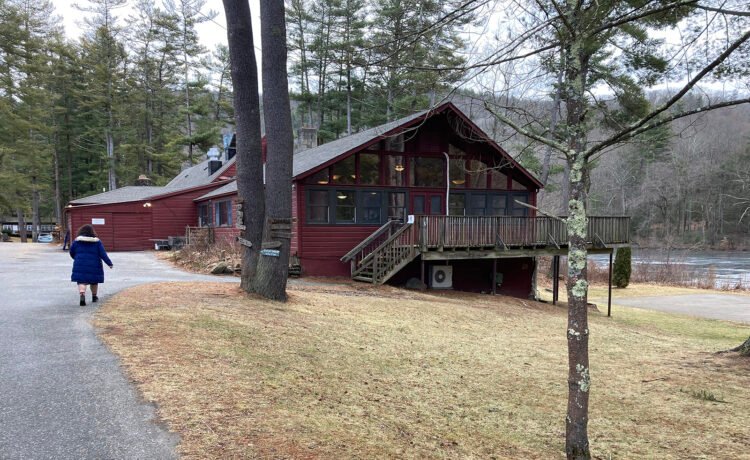FALLS VILLAGE, Conn. (RNS) — One day into a three-day retreat for Orthodox Jews who identify as LGBTQ+, Zippy Spanjer looked around and liked what she saw.
A 29-year-old from Rochester, New York, Spanjer was experiencing for the first time what has become an annual pilgrimage where Jews with diverse sexual identities can unwind and be themselves.
“I have not found a place where I am comfortable being both Jewish and queer,” said Spanjer. “In the Jewish spaces, you never know how someone’s gonna think about the queer stuff, and in the queer spaces you never know how someone’s gonna think about the religious stuff. And to me, these aren’t diametrically opposed.”
Spanjer was part of a vibrant social scene with other LGBTQ+ students when she was a student at the Stern College for Women at Yeshiva University, and part of the underground Pride Alliance. But since graduating and moving back to Rochester, New York, her social life has suffered.
Here, however, in the scenic foothills of the Berkshire Mountains at the Isabella Freedman Jewish Retreat Center, she was able to celebrate Shabbat, pray, sing, cry and share stories with 96 Orthodox or formerly Orthodox Jews who identify as queer from across the U.S.
“I feel embraced,” she said.
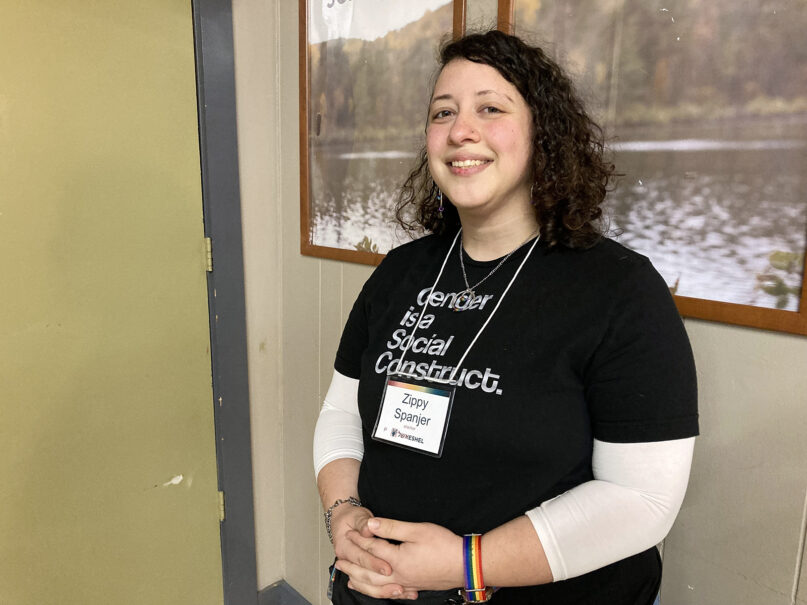
Zippy Spanjer, a first-time participant at an annual retreat for LGBTQ+ Jews at the Isabella Freedman Jewish Retreat Center in Falls Village, Conn., on Jan. 17, 2025. (RNS photo/Yonat Shimron)
Participants at the retreat, put on by Eshel, a New York-based nonprofit with a mission to build LGBTQ+ inclusive Orthodox Jewish communities, came in all their varied splendor. There were men in yarmulkes and fringed prayer shawls and women wearing body-hugging mini dresses. (Most wore jeans and sweaters, topped with giveaway beanies in pink or black.) There were closeted queer Jews who didn’t want to share their names or photos because they might lose their jobs, custody of their children or relationships with their families if their sexuality was revealed. Others were fully out and married to same-sex partners.
The retreat was a casual affair with multiple ways to participate. One group met over breakfast each morning to study a page of Talmud. Others stayed up late Saturday for karaoke and dancing. In addition to Hasidic pop tunes, they shimmied to Chappell Roan’s “My Pony Club,” Lady Gaga’s “Born This Way” and Whitney Houston’s “I Wanna Dance with Somebody.”
“People here experience what it feels like to be whole, and they take that with them, hopeful that they can recreate some of what they had during the retreat in their lives,” said Miryam Kabakov, Eshel’s executive director, a gay Jew who co-founded the organization in 2012. Its name, Eshel, is the Hebrew word for the biblical tamarisk tree.
Queer Jews in Reform, Conservative and other denominations are accepted as equals. In many Orthodox Jewish settings, by contrast, including the vast Haredi world, strict adherence to Torah and Jewish law has kept many closeted or unable to live openly in synagogue settings.
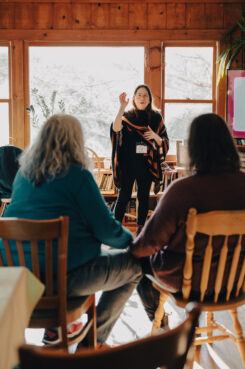
Miryam Kabakov, Eshel’s executive director, leads the closing circle at a retreat for queer Orthodox Jews at the Isabella Freedman Jewish Retreat Center on Jan. 19, 2025. (Photo by Rebecca Bloomfield Photography)
In 2012, the Rabbinical Council of America representing Modern Orthodox rabbis withdrew support of Jewish conversion therapy organization JONAH. The rabbis’ official statement said there was a lack of scientifically rigorous studies that supported the effectiveness of the therapies that attempt to change someone’s sexual attraction.
But over the ensuing decade, the Orthodox world has made limited strides toward reinterpreting texts that condemn gay love as a transgression.
Many Orthodox congregations do not recognize same-sex couples and will offer them memberships individually, but not as a couple or household. Rabbis won’t perform their marriages or even congratulate such engagements with a “mazel tov” as they do straight couples. In 2017, the Hebrew Institute of Riverdale was told to stop announcing same-sex marriages in its Shabbat newsletter or risk losing membership in the Orthodox Union, the umbrella group of Orthodox synagogues.
Transgender people have it even harder. Since Orthodox congregations seat men and women separately with a divider in the middle, called a mechitza, trans people must often sit in the section corresponding to their sex at birth rather than their chosen gender. At prayer services during the retreat, transgender people could sit in whatever section they felt comfortable. Eshel divided the room into three sections: one for men, one for women, and one for nonbinary people.
Eshel pushes for change in Orthodox settings. Over the course of the retreat, participants could attend sessions such as, “Strengthening Personal and Communal Safety,” and “How to Effect Meaningful Change in Orthodoxy.”
“There is a kind of presumption, almost a definitional presumption, that the brand of ‘Orthodox’ doesn’t change,” said Rabbi Steve Greenberg, a co-founder of Eshel who is gay and married. ““But the truth is that the tradition has always been in a process of renegotiation and movement in response to changing historical realities, from its very beginning.”
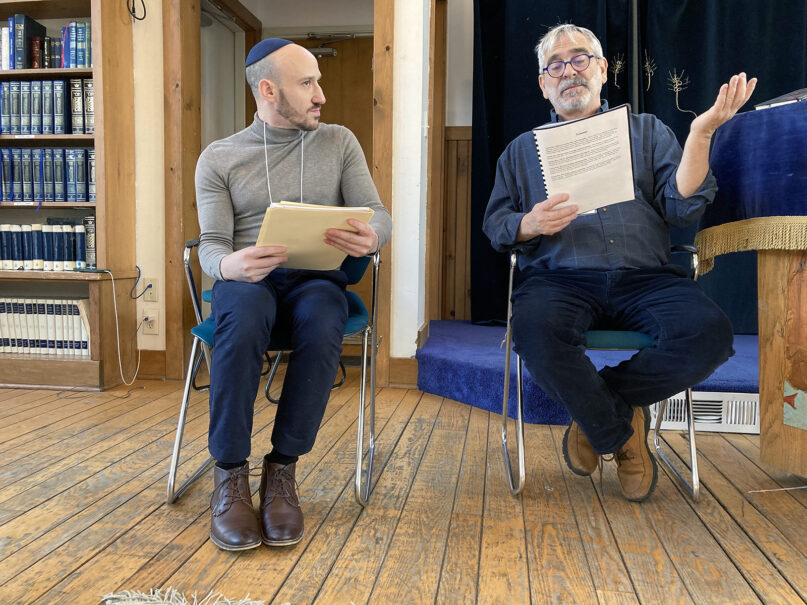
Rabbi Steve Greenberg, right, one of the founders of Eshel, and Ely Winkler, its director of advancement, share tips on how queer people can achieve meaningful change in Orthodox Jewish synagogues during a session at an annual retreat for LGBTQ Jews in Connecticut on Jan. 19, 2025. (RNS photo/ Yonat Shimron)
Eshel itself has documented that change. In a recent survey of 278 Orthodox rabbis across the country, the organization found a growing number engaged in discussions about how to welcome LGBTQ+ Jews, even if the institutions with which they affiliate were not quite ready to embrace their lifestyles.
In large cities with sizable Jewish populations — New York, Los Angeles, Boston, Philadelphia — queer Orthodox Jews can find one or two affirming congregations. Those who live elsewhere often find synagogue acceptance difficult, if not impossible.
Elie Friedman, 37, one of the participants, is one of the lucky ones. A lawyer who works as a public defender in Newark, New Jersey, Friedman is engaged to be married this spring. He and his fiancé, also a lawyer, are both out. Their families are supportive, and they have found a welcoming Modern Orthodox congregation on the Upper West Side of Manhattan where they live.
Friedman, however, recognizes that many other gay Orthodox men are struggling. He came to the Eshel retreat this year to meet old friends and to help those who don’t enjoy the same level of acceptance he has found.
“I’m in a position to also help others, to talk to people, to be a helpful, supportive presence,” Friedman said. (Eshel participants were assigned to small groups that met three times over the course of the weekend to talk about their struggles.)
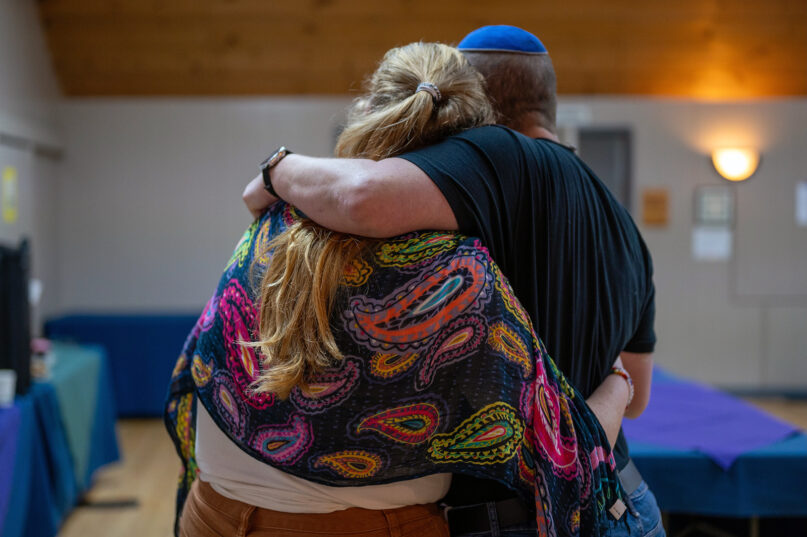
Two participants at an annual retreat for queer Orthodox Jews hug at the Isabella Freedman Jewish Retreat Center in Falls Village, Conn. (Photo by Rebecca Bloomfield Photography)
Friedman thinks the Orthodox world has to accommodate LGBTQ+ people if it wants to have a vibrant future.
“It can be really hurtful to raise a kid in this environment and tell them this is the best life, but then also to know they can’t be part of it,” Friedman said.
At a session on how to fight for acceptance, two Eshel staff offered participants advice on how to advocate for greater rights: Don’t portray yourselves as rebels, they advised. Insist on fairness. Ask for concrete and discrete changes. And perhaps most important — find allies.
Not everyone, though, wants to devote their energies to the fight. Avi Fuld, another participant, said remaining an Orthodox synagogue member became increasingly hard after he came out in his mid 20s. Now married and living with his husband in Dutchess County, about 70 miles north of New York City, Fuld and his husband have decided not to join the county’s lone synagogue in their area. Instead, they have helped birth a grassroots Jewish community of LGBTQ+ and straight families that gets together socially for Shabbat meals, holiday get-togethers and hikes in the woods.
“I’m so disillusioned with Orthodoxy, and that’s why I’ve chosen to create this community for myself that I think embodies a lot of traditional values of Judaism — just without the institutional framework,” said Fuld, who is 33. “I just find that I love the people, and I love the rituals, and I love tradition, but whenever I rub up against institutions, there’s always these red lines: We will treat you equal until a certain point. There’s always a line.”

Avi Fuld at the Isabella Freedman Jewish Retreat Center in Falls Village, Conn. (RNS photo/Yonat Shimron)
Shaindy Weichman, another retreat participant, also stepped away from Orthodoxy. She grew up in the Brooklyn neighborhood of Williamsburg in a Satmar Haredi sect. From the time she was a teen, Weichman knew she was not attracted to men. But she had no way of understanding what that meant, because in her insular Haredi world, sex was not discussed either at home or at school. In keeping with her family’s expectations, she agreed to an arranged marriage two weeks shy of her 18th birthday. By age 19, she was a mother.
In her mid-20s, when she finally understood she was gay, she panicked.
“I was like, oh my God, what do I do now? My life is over,” said Weichman. “There are no queer Jews. If you’re gay, that’s it. You’re done for. You can’t be religious.”
Now 38, divorced and estranged from her family, she knows there are queer Jews, but her break with religious practice feels permanent. She still likes to come to the annual Eshel retreats, though.
At the closing circle on Sunday afternoon, the 96 participants stood up and sang a Hebrew hymn, “Ozi ve-Zimrat Yah,” or “The Lord Is My Strength and Might.” Each one then shared a word about what the retreat meant to them: “grateful,” “blessed,” “connected,” “peaceful” and “happy” were among the words shared more than once.
Finally Kabakov took a big spool of navy blue yarn and unraveled it so that every person held a piece of it. Then they cut off a small piece to keep, which many tied on their wrists.
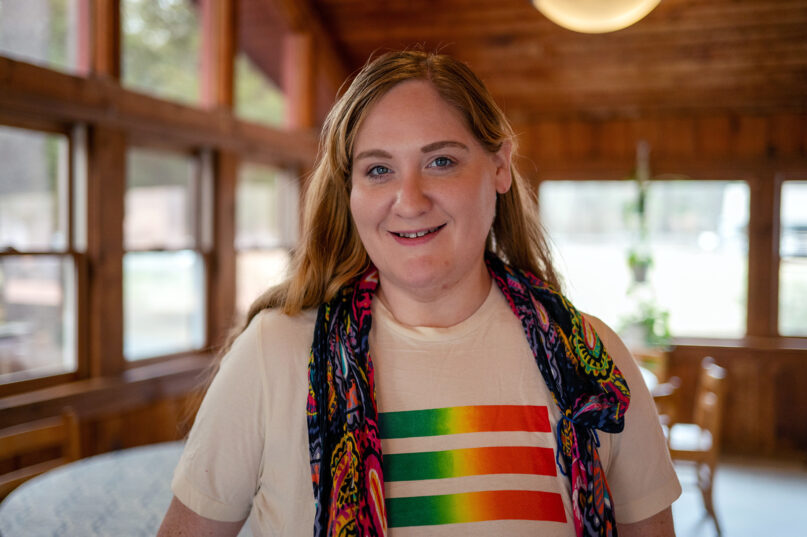
Shaindy Weichman at the Isabella Freedman Jewish Retreat Center in Falls Village, Conn. (Photo by Rebecca Bloomfield Photography)
Weichman said she was reminded why she makes the annual pilgrimage.
“Every year at Eshel, I always ask myself, ‘Why are you coming back here? You’re done questioning.’ And when I come back I’m like, ‘Oh yeah. They love me here.’”
RELATED: LGBTQ+ Americans are more religious than our Supreme Court battles let on

